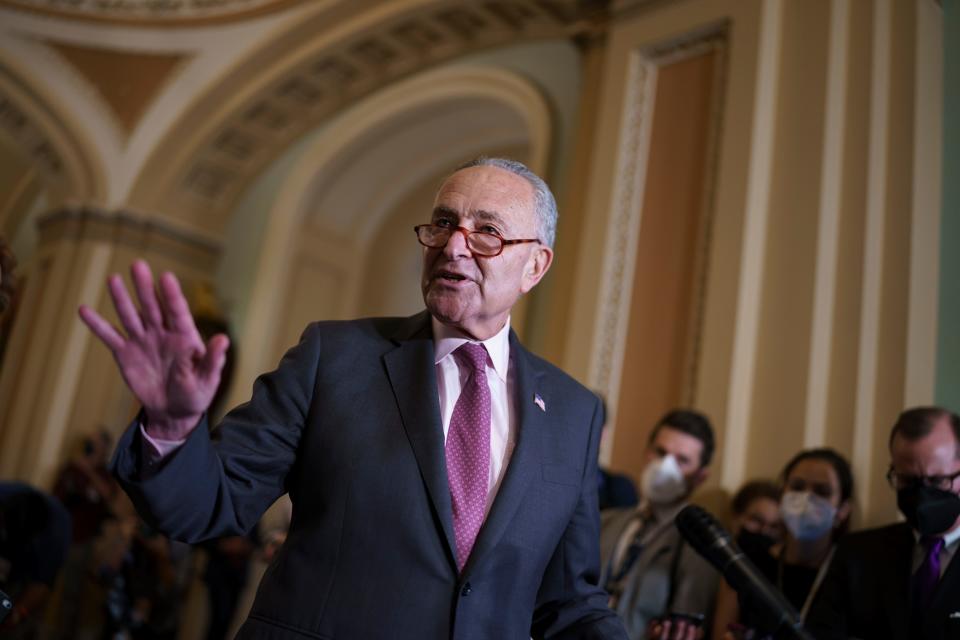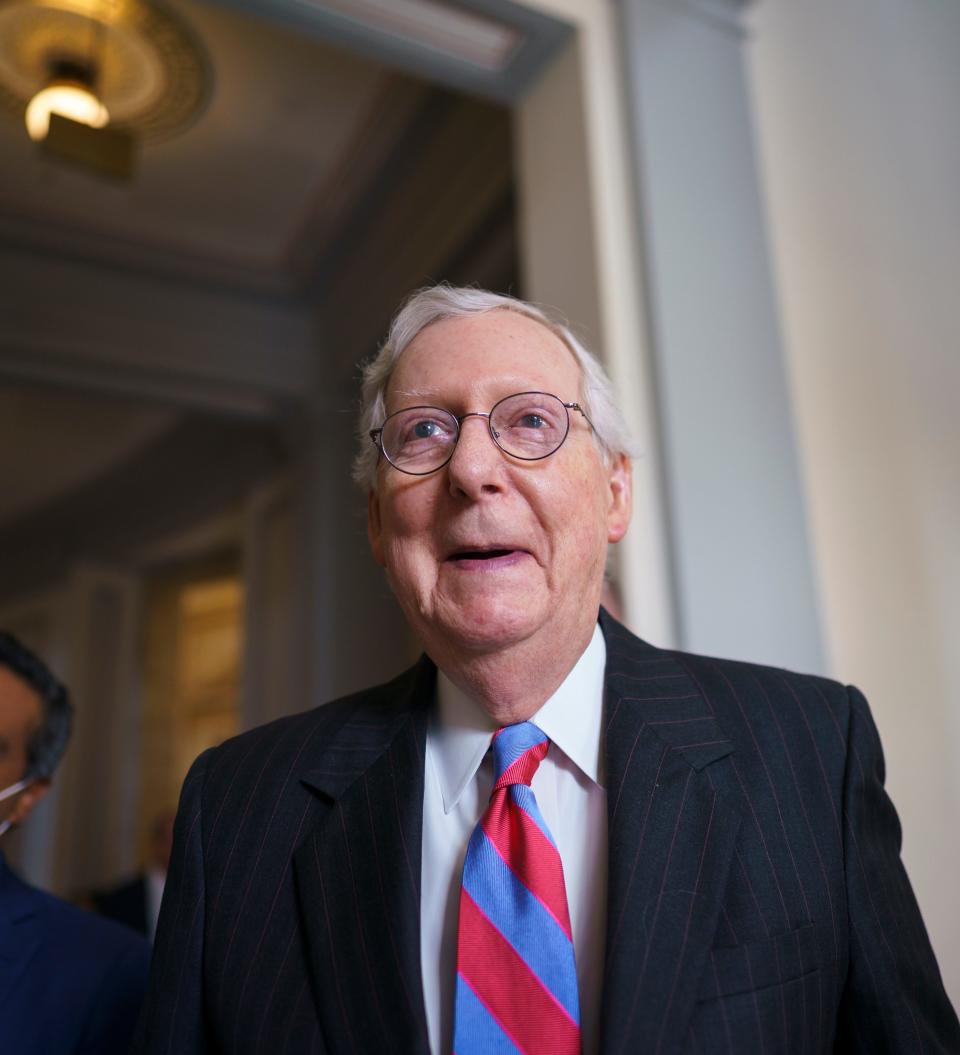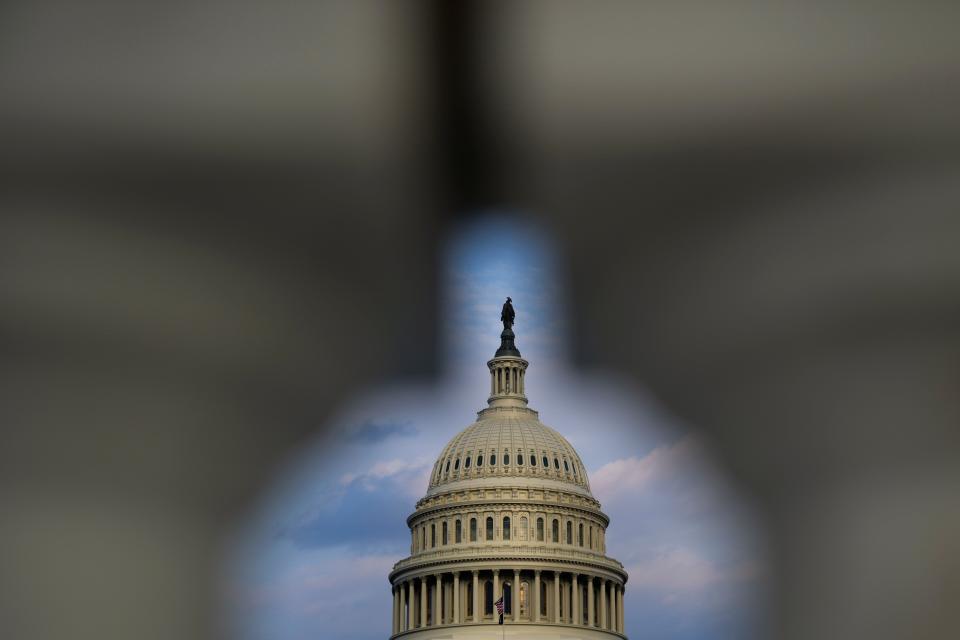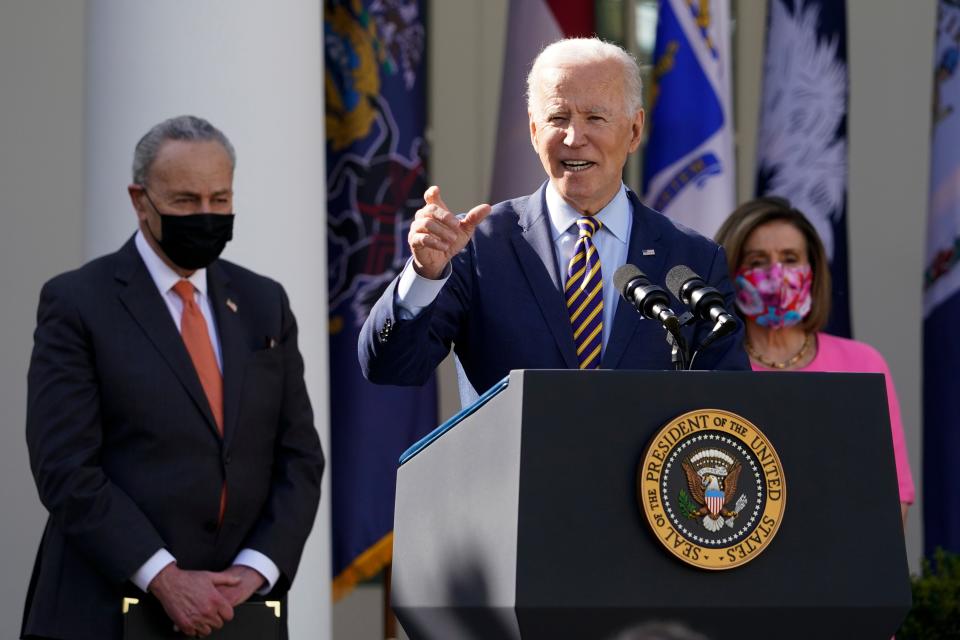Democrats and Republicans want the debt ceiling raised: So why the delay on Capitol Hill?
- Oops!Something went wrong.Please try again later.
WASHINGTON – The United States has never defaulted on its debt before. And despite the Treasury Department's warning that the U.S. may be less than two weeks from being unable to pay its bills, the federal government is at a standstill of how to address that.
Treasury Secretary Janet Yellen told CNBC on Tuesday morning that failing to raise or suspend the debt ceiling by Oct. 18 would be "catastrophic."
"I fully expect it would cause a recession as well," she said.
More: The US has never defaulted before. In the debt ceiling crisis, what happens if it does?
So, why are lawmakers at an impasse as the clock is ticking?
Lawmakers from both chambers agree the ceiling has to be raised or suspended so the U.S. can continue to pay its debts and to avoid economic chaos. But Democrats and Republicans in the Senate are clashing over how to pass a bill to raise the debt ceiling and who must do it.
"The debt ceiling needs to be addressed," Senate Minority Leader Mitch McConnell, R-Ky., said Tuesday. "The only question is, who should address it?"
Democrats have been calling for bipartisan support to pass legislation to suspend or increase the debt ceiling, despite Republicans insisting for months that Democrats in the majority must solve it alone.
Both parties are trying to force the other's hand as Oct. 18 approaches.
What Democrats want
Senate Majority Leader Chuck Schumer, D-N.Y., says the Senate should raise the debt limit in a bipartisan vote. And if Republicans refuse to help, they should stop blocking the stand-alone legislation.
"Senate Republicans have manufactured a crisis that threatens to plunge our economy back into recession. We do not have the luxury of using a drawn-out, convoluted and risky process, We could prevent a catastrophic default with a simple majority vote tomorrow. If Republicans would just get out of the damn way, we could get this all done," Schumer said Tuesday.
Democrats in the House passed legislation last week to suspend the country’s debt limit until late 2022. The Senate is currently debating that bill.
Schumer announced the Senate would vote Wednesday to end debate on the legislation, but that would need 60 votes, and it is unlikely 10 Republicans allow it to go forward. If it were to clear the 60-vote threshold, the bill could be passed with a simple majority – just 51 votes with Vice President Kamala Harris's tie-breaking vote.
"It would certainly be very helpful, whether or not throngs of Republicans were going to join us ...if they just didn't filibuster," Sen. Ron Wyden, D-Ore., chairman of the Senate Finance Committee, told USA TODAY.
Senate Democrats attempted to pass separate legislation last week that addressed the issue, but that effort was blocked by Republicans.
More: Biden calls for Senate to vote on debt limit increase this week
Democrats have said the debt limit suspension should be bipartisan and have pointed out that Democrats helped Republicans suspend the debt limit when the GOP was in power.
During former President Donald Trump’s tenure, the debt limit was raised three times as the national debt increased and the government approved trillions to combat the COVID-19 pandemic. In Trump's term, the national debt increased by roughly $7 trillion.
“A meteor is headed to crash into our economy,” President Joe Biden said Monday, telling Republicans, “Just get out of the way, so you don’t destroy it.”
Biden said he couldn't guarantee the U.S. would avoid default. He said the decision will depend on Republican cooperation from McConnell to allow Democrats to vote.
“That’s up to Mitch McConnell," Biden said Monday. “I can’t believe that that will be the end result because the consequence is so dire."

What Republicans are saying
McConnell has said since July that Republicans would refuse to help raise the debt limit.
He said Democrats, who control the White House, House and Senate, refused to negotiate with Republicans on recent spending proposals – hinting at a budget bill with trillions for social programs that Democrats are ironing out – so they can raise the limit on borrowing on their own.
"They said they're perfectly prepared to do the jobs themselves," McConnell said Tuesday. "The easiest way to do that is through the reconciliation process."
McConnell says Democrats will should pass an increase in the debt limit through a budget reconciliation, a process with special rules that would allow Democrats in the Senate to avoid a filibuster and raise the debt ceiling with a simple majority vote and without Republican support.
On Monday, McConnell warned Biden in a letter that Democrats are "sleepwalking" toward economic catastrophe by pursuing the bill that Republicans oppose.
Schumer has said repeatedly he does not want to use reconciliation, describing it last week as a "non-starter" and "risky" given the complexity of the process, and the length.
Through reconciliation, there would have to be two lengthy series of amendment votes — known as "vote-a-ramas" — and it is likely they would have to increase the debt limit with a fixed number instead of just suspending the ceiling.
The House would also have to be involved in crafting the budget resolution. A Senate source told USA TODAY that would take around two weeks to complete, meaning if this is the mechanism Democrats choose to use, despite their resistance to do so, they have to start now.
Schumer was asked multiple times Tuesday if he would rule out using reconciliation if the cloture vote fails Wednesday. He was clear he didn't want to use it, but did not rule it out entirely.


Both sides are pointing fingers
As they debate how to move the bill through Congress, both sides are accusing the other of acting with ill will.
Republicans are tying to pin Democrats as reckless spenders.
Sen. Lindsey Graham, R-S.C., told reporters Tuesday he is going to vote to block Democrat's effort to suspend the debt ceiling, saying “we are not going to empower a radical march towards socialism.”
McConnell said Monday that Democrats are trying to raise the debt limit so they can approve the separate multitrillion-dollar package of social welfare programs.
“They want that shortcut, so they can pivot right back to partisan spending as fast as possible,” McConnell said on the Senate floor. “This unified Democratic government is having trouble governing.”
'Close the deal': Biden struggles to unite Democrats behind his economic agenda

Senate Democrats with whom USA TODAY spoke on Tuesday said politics could be the reason why Republicans are obstructing the legislation.
"McConnell is only interested in power and taking back the House and the Senate, and, along the way, doesn't care who he hurts," explained Sen. Mazie Hirono, D-Hawaii, who said she thinks the GOP strategy is "politically motivated."
"The debt ceiling [defaulting] would be very catastrophic for our economy, so he's hoping to blame it on the Democrats."
Schumer pointed out Tuesday that Republicans can vote to end the filibuster, and not vote to raise the limit, so they can tell their voters they voted against it.
This article originally appeared on USA TODAY: Debt ceiling talks in Congress are about who should raise the limit

